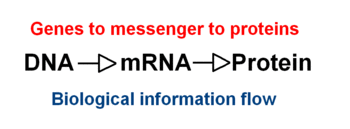Central dogma of molecular genetics: Difference between revisions
imported>Subpagination Bot m (Add {{subpages}} and remove any categories (details)) |
mNo edit summary |
||
| (One intermediate revision by one other user not shown) | |||
| Line 4: | Line 4: | ||
<blockquote>"My mind was, that a dogma was an idea for which there was no reasonable evidence." | <blockquote>"My mind was, that a dogma was an idea for which there was no reasonable evidence." | ||
<ref>See discussion in Chapter 7. Horace Freeland Judson (1979). ''The | <ref>See discussion in Chapter 7. Horace Freeland Judson (1979). ''The Eighth Day of Creation: Makers of the Revolution in Molecular Biology.'' ISBN 0140178007.</ref> ([[Francis Crick]])</blockquote> | ||
Famously, Crick seems to have misunderstood the precise meaning of the word ''dogma'' when formulating his brilliant hypothesis of how the [[genetic code]] of [[genes]] is used in cells during synthesis of proteins to determine, via RNA intermediates, the order of amino acid residues in proteins. | Famously, Crick seems to have misunderstood the precise meaning of the word ''dogma'' when formulating his brilliant hypothesis of how the [[genetic code]] of [[genes]] is used in cells during synthesis of proteins to determine, via RNA intermediates, the order of amino acid residues in proteins. | ||
| Line 16: | Line 16: | ||
==References== | ==References== | ||
<references/> | <references/>[[Category:Suggestion Bot Tag]] | ||
Latest revision as of 11:00, 26 July 2024

"My mind was, that a dogma was an idea for which there was no reasonable evidence." [1] (Francis Crick)
Famously, Crick seems to have misunderstood the precise meaning of the word dogma when formulating his brilliant hypothesis of how the genetic code of genes is used in cells during synthesis of proteins to determine, via RNA intermediates, the order of amino acid residues in proteins.
The core of his idea seems to have fallen into place in February 1956 with the idea of adapter molecules (now called tRNA), which align particular amino acids against a genetically coded message, and developed by Crick into the concept he dubbed The Central Dogma in September 1957.
As reported by Horace Judson, Crick wrote in his paper On protein synthesis [2]:
The Central Dogma. This states that once "information" has passed into protein it cannot get out again. In more detail, the transfer of information from nucleic acid to nucleic acid, or from nucleic acid to protein may be possible, but transfer from protein to protein, or from protein to nucleic acid is impossible. Information means here the precise determination of sequence, either of bases in the nucleic acid or of amino acid residues in the protein.
References
- ↑ See discussion in Chapter 7. Horace Freeland Judson (1979). The Eighth Day of Creation: Makers of the Revolution in Molecular Biology. ISBN 0140178007.
- ↑ Crick FH (1958) On protein synthesis Symp Soc Exp Biol 12:138-63